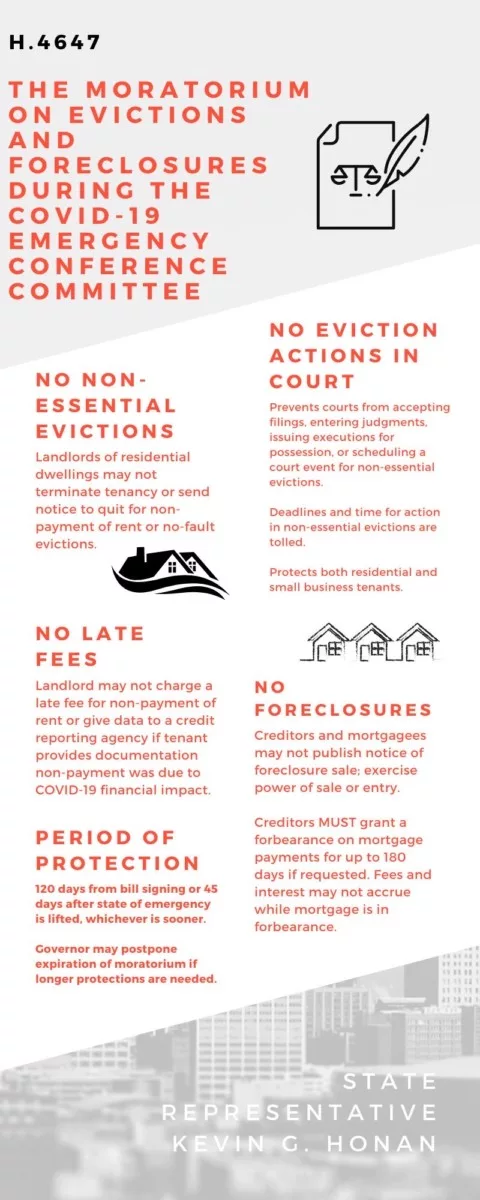By Representative Kevin G. Honan, 17th Suffolk

Everyone in the United States has been impacted in some way by the COVID-19 pandemic. However, business closures and stay-at-home orders have disproportionately affected low-income individuals and families, many of whom were rent burdened even before the way of life changes brought on by this pandemic. According to the National Low Income Housing Coalition, more than 40% of low-income families pay more than half of their income on rent each year. As unemployment continues to rise and families are forced to make tough decisions about where their diminished incomes will be spent, it is imperative we keep Massachusetts families stably and safely housed.
This is why Representative Mike Connolly and I filed an eviction and foreclosure moratorium in the days immediately following Governor Baker’s state of emergency declaration in early March. We felt strongly that no person should have to worry about being evicted or foreclosed on while we are in an active state of emergency.
After both Houses swiftly acted to pass their own versions of this legislation and a conference committee negotiated the differences, the governor signed H4647, An Act Providing for a Moratorium on Evictions and Foreclosures During the COVID-19 Emergency on April 20. The final legislation places a moratorium on non-essential evictions for tenants and small businesses for 120 days, or for 45 days after termination of the state of emergency, whichever is sooner. A non-essential eviction is defined as one that is caused by non-payment of rent or for no fault or cause. The bill also authorizes Governor Baker to extend the moratorium in 90-day increments, if necessary. Additionally, this legislation prevents creditors and mortgagees from publishing a notice of foreclosure sale or foreclosing on residential properties during the same time period.
This bill halts eviction proceedings at every stage. A landlord may not send a notice to quit or any other notice for a tenant to vacate the property. It also prevents Massachusetts courts from accepting filings for eviction cases, entering judgments or default judgments, or issuing execution orders for existing cases, which grants tenants full protection from evictions. This is important because while the Massachusetts Housing Court drastically diminished the number of proceedings on its docket for public health and safety reasons, hundreds of eviction cases were still being filed in the late weeks of March and early weeks of April.
 Removing people from their homes through eviction or foreclosure is a direct dismissal of the advice from the Department of Public Health urging everyone to stay home and socially distance as much as possible. Carrying out an eviction at this time puts tenants, family members, sheriffs, movers, and potentially countless others at risk of exposure. We are already seeing a significant increase in the number of positive cases amongst our homeless populations and the need is steadily outpacing the number of available beds we have in designated isolation facilities. To place unnecessary strain on a system that is already at capacity would have disastrous results. The health of ALL of us is at stake.
Removing people from their homes through eviction or foreclosure is a direct dismissal of the advice from the Department of Public Health urging everyone to stay home and socially distance as much as possible. Carrying out an eviction at this time puts tenants, family members, sheriffs, movers, and potentially countless others at risk of exposure. We are already seeing a significant increase in the number of positive cases amongst our homeless populations and the need is steadily outpacing the number of available beds we have in designated isolation facilities. To place unnecessary strain on a system that is already at capacity would have disastrous results. The health of ALL of us is at stake.
This is one of the most important pieces of legislation we will pass during this state of emergency. With so much uncertainty, anxiety, and isolation involved in this pandemic, I am proud that we have given Massachusetts families and individuals some peace of mind knowing they will not have to worry about an eviction in their immediate future.
Lawmakers recognize the importance of housing stability during this crisis, and I know that we will continue to take steps to take care of our most vulnerable residents both during and in the aftermath of this crisis. Metro Housing|Boston is an important partner in our work, and I thank them for all of the assistance that they provide to my constituents during this time, and on a daily basis.
Representative Kevin G. Honan has served in the Massachusetts House of Representatives for more than 30 years, representing District 17th in Suffolk County. He serves as Chairperson, Joint Committee on Housing.